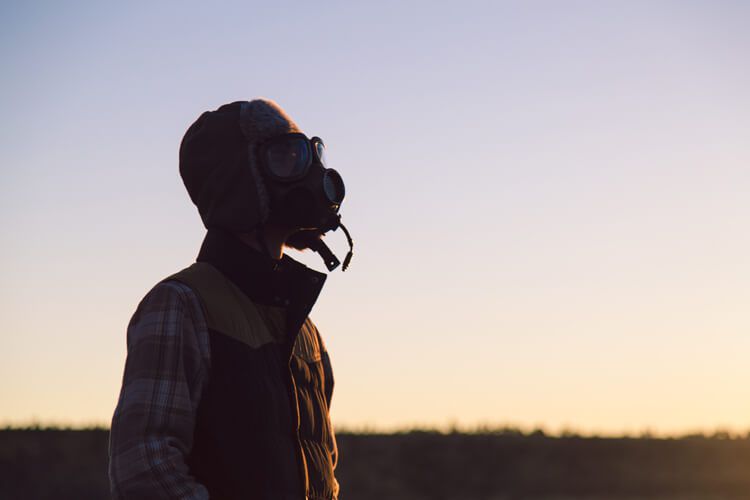Symptoms of Stachybotryotoxicosis
In the late 1930s, stachybotryotoxicosis was reported in humans working on farms in Russia. People who were affected are those who handled hay or feed grain infested with S. chartarum.
Some of the individuals who were infected had burned the straw or even slept on straw-filled mattresses that had rampant growth of Stachybotrys chartarum. The infested straw can be described as black in color from growth of the fungus.
Common Symptoms
Common symptoms in humans that have stachybotryotoxicosis are rashes – especially in areas subject to perspiration, dermatitis, pain and inflammation of the mucous membranes of the mouth and throat, conjunctivitis, a burning sensation of the eyes and nasal passages, tightness of the chest, cough, bloody rhinitis, fever, headache, and fatigue.
The workers who were infected developed symptoms within two to three days of exposure to the fungus. Some members of the Russian teams investigating this disease rubbed the fungus onto their skin to determine its direct toxicity.
The fungus induced local and systemic symptoms similar to those observed in naturally occurring cases.
Mold in the Media
It was seen in recent years that a cascade of reports about toxic molds was constantly seen in the national media. The New York Times Magazine, August 12, 2001 issue, ran a front page story on toxic mold.
Television news shows have run entire programs on Stachybotrys contamination of homes to alert the public and educate them on how dangerous these molds can be. Because of the sudden media coverage of this fungus, it has resulted in multimillions of dollars of litigations.
It also caused a lot of problems for homeowners and building managers who must deal with the human issues related to mold.
Further Recommended Reading
- How Does Black Mold Affect Economic Costs?
- 10 Things You Should Know About Mold
- Symptoms of Mold Exposure


13 comments
[…] effects or allergies in people. Also note that Acremonium sp. is found growing very closely with stachybrotys mold – the most dangerous type of mold found so far. Asthma is a big problem these types of mold can […]
[…] Stachybotrys also goes by the name of “black mold†or “toxic mold.†This type of mold is thought to be responsible for a decrease in memory and worsened lung capacity in the very old and the very young, but may even cause health problems in healthy median-aged individuals as well. Besides health problems, black mold also causes damage to a home’s structure. For these reasons, it’s a good idea to be on the lookout for black mold in your home. […]
[…] Stachybotrys chartarum, also called “black mold†or “toxic mold,†is especially dangerous in schools where it infects the air breathed by many young students. […]
[…] Black mold covered entire floors, rotting out floorboards and spreading up walls. Not only did mold become a problem indoors, but exposed wood and other home materials quickly became victim as well. […]
[…] What is Black Mold? […]
[…] Mold, also known as Stachybotrys Chartarum. Stachybotrys Chartarum is a greenish-black fungi found worldwide that colonizes particularly well […]
[…] worst of these suspected toxic molds is stachybotrys chartarum, a variety of black mold that requires nearly constant […]
Hello I have been sick for close to two years. I found My symptoms in a mold site and started searching for mold in My house. I found black mold inside My ceiling below My tub. I have a burning sensation in My nose and throat, headaches, lethargic, sore throat, rhinitis, burning eyes and clammy-tingly hands. I’ve been to multiple Doctors w/ no help. can anyone direct Me to a Doctor? Thx. brian@dfartistic.com
Hello I have been sick for close to two years. I found My symptoms in a mold site and started searching for mold in My house. I found black mold inside My ceiling below My tub. I have a burning sensation in My nose and throat, headaches, lethargic, sore throat, rhinitis, burning eyes and clammy-tingly hands. I’ve been to multiple Doctors w/ no help. can anyone direct Me to a Doctor? I’m in Arizona
Thx. brian@dfartistic.com
NOW IF THEY COULD JUST TELL MY DOCTORS HOW TO GET IT OUT OF ME I JUST MIGHT LIVE. ALL YOU PEOPLE ARE WORRIED ABOUT YOURHOMES YOU SHOULD HAVE TO LIVE WITH IT TAKING YOUR LIFE A LITTLE AT A TIME. NOT MANY ORGANS LEFT, SO YES FIX YOUR LEAKS PEOPLE BECAUSE IT IS SO VERY PAINFULL TO LIVE THIS WAY. ATTHE COST OF THE TAX PAYYERS MONEY FROM1999 TO TODAYS DATE, YES IT IS REAL
I had a mold mushroom growning out of my bdrm wall about 4 yrs ago. All they did was pull it off and put some of that fill holes. Now my wrist has starting hurting so bad. My daughter and I hair has starting thining and she’ll only 15. So I’m wondering if the mold is still in the wall. Im all ways having leaks in my celling, in my closet. My landlord wont do anything. So please let me know something.
The accident of finding this post has brehetgnid my day
Felicia. Report your landlord immediately. To the health department of wherever you live. And find out from them who else you should contact. If you can’t figure out who to call, call the police – they’ll tell you. If full remediation isn’t done immediately (!) Move out! Don’t depend on your landlord to fix something like that while your health is at risk. In fact, with a landlord like that I would move out anyway. The landlord is either ignorant (which he / she shouldn’t be if they’re a landlord) or they just don’t care. And even if they are ‘simply’ ignorant, they obviously don’t care enough to get the information. Who wants a landlord like that? Move out! And don’t forget to report them so they aren’t allowed to keep renting out a place that can make other people sick.